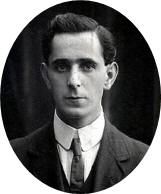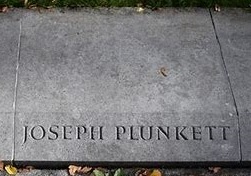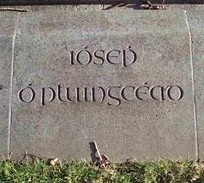Joseph Mary Plunkett (1887 - 1916)
Irish Patriot, Poet, Writer, Linguist, Gaelic League member, Irish Volunteer, Irish Republican,
Easter Proclamation Signatory. Executed Leader of the 1916 Easter Rising.
 Early Life
Early Life
Joseph Mary Plunkett, the second of seven children, was born on November 21, 1887 in Dublin to George Noble Plunkett and Josephine Plunkett (nee Cranny).
Plunkett's father was a wealthy barrister, a landowner and a property developer. He was made a Papal Count in 1884 for donating money and property to a nascent Roman Catholic nursing order. He was also a Knight of the Equestrian Order of the Holy Sepulcher. In addition to his virtuous spiritual dimension he was an ardent Irish Nationalist and, after the Easter Rising, an Irish Republican who served in the government of the Irish Republic from 1919 to 1922. He also served as a TD for north Roscommon from 1917 through 1927. Plunkett's mother was the daughter of another wealthy property owner.
The Plunkett family's Hiberno-Norman lineage can be traced back to Co. Louth where they were granted lands by Strongbow, the Earl of Pembroke, for their participation in the 1169/71 invasion and conquest of Ireland. In succeeding centuries, the Plunkett name featured prominently in the peerages of both England and Ireland. One of the best-known Plunkett notables was Oliver Plunkett (1625 - 1681), the Catholic Archbishop of Armagh and Primate of All Ireland. On July 1, 1681, he was hanged, drawn and quartered at Tyburn in London for adherence to his faith, a treasonous offence under England's self-assumed rights of conquest. He was canonized a saint in 1975 becoming the first Irish saint in seven hundred years.
Plunkett's six siblings' names are worthy of mention here for their patriotism and courage in openly participating in Ireland's quest for national sovereignty. Their names in chronological order are Philomena, Moya, Geraldine, George, Fiona and John. Both George and John, who were with Plunkett in the GPO during the Easter Rising, were amongst the 90 Volunteers sentenced to death in its aftermath. Before General Maxwell could carry out all the executions, his superiors in London put the brakes on after realizing that the otherwise docile Irish populace were awakening to the callousness of their response, at a time that thousands of their countrymen were fighting and dying to safeguard the interests of the British Empire on the Western Front and in far-off Gallipoli. The "freedom of small nations" so loudly touted by John Redmond and other Anglophiles as the rallying cry for Irishmen to join the British Army mattered little to their masters in London, especially with regards to Ireland's freedom.
By virtue of his family's wealth, Plunkett was able to attend the best Catholic schools including the Catholic University School in Dublin, Belvedere College also in Dublin and Stonyhurst College in Lancashire, England. During his studies at Stonyhurst College he gained some military knowledge such as basic military strategies and tactics from the University Officers' Training Corps, i.e., a military leadership training program operated by the British Army. After completing his studies in England Plunkett enrolled in University College Dublin (UCD) from whence he graduated with a degree in philosophy in 1909.
During his adolescence Plunkett had contacted glandular tuberculosis (TB), the virulent killer that consumed thousands of lives in Ireland during the first half of the 20th century. Before the advent of the BCG vaccine, the proscribed treatment for TB was rest, exercise and fresh air. To that end and after graduating from UCD Plunkett headed off to the warmer and dry-air climates of the Mediterranean and North Africa in hopes of affecting a cure. After all, teeming Dublin was not an ideal setting for anyone suffering from TB. Over a two-year period through 1911, he spent time in Italy, Egypt and Algeria. During his time in Algeria he studied the Arabic language and literature and, according to some accounts composed poetry in Arabic. While there and despite his weakened state he became an accomplished roller skater and according to some accounts was offered a job as manager of a skating rink.
Nationalist Activism
After having settled in back in Ireland Plunkett joined the Gaelic League founded by Douglas Hyde in 1893. He did so in order to learn Irish and immerse himself in the Gaelic Revival movement spearheaded by the League. The aim of the League was to revive the Gaelic language and de-anglicize Ireland by replacing the pervasive English acculturation of Ireland with an Irish-Celtic centric culture. Referred to by some detractors as "an organization of the Irish bourgeois intelligentsia", the League did indeed attract some of Ireland's best talent including Thomas MacDonagh, Padraic Pearse, Mary Maquire Colum, Padraic Colum, Gobnaıt Ní Bhruadaır (Albinia Lucy Brodrick), Roger Casement and many other literary and political notables of that time. In so many ways the Gaelic League was the metaphoric cauldron that gave birth to the Easter Rising. Without the Gaelic League there would be no Easter Rising.
In preparation for his UCD entrance exams Plunkett engaged Thomas MacDonagh to tutor him in Irish. Despite their student-tutor relationship and the ten-year age gap Plunkett and MacDonagh became close friends and kindred spirits bound by their shared commitment to the Gaelic Revival movement and Ireland's independence. In the spirit of that commitment they collaborated on several projects including as editors of the Irish Review, a monthly literary, arts and science magazine published from March 1911 to November of 1914 when it was suppressed under the Defense of the Realm Act. In 1914 they collaborated with Edward Martyn, the noted playwright and Irish Nationalist, in founding the Irish Theatre in Dublin that produced plays by Irish playwrights. They were both members of the Irish Volunteers and the Irish Republican Brotherhood. They were also signatories to the 1916 Easter Proclamation as well as involved in the planning, preparations and launching of the ensuing Easter Rising and, in its aftermath, were martyred along with its other leaders. It was MacDonagh who introduced Plunkett to his wife's sister, Grace Gifford.
In 1913 Plunkett was a member of the Industrial Peace Committee setup to negotiate a settlement between the workers and business owners during the 1913 Lockout. Along with MacDonagh and other Nationalist leaning members Plunkett advocated for the workers. Their efforts came to naught as the business owners were intransigent, unwilling to concede any ground to the workers. With no prospects of a settlement the Committee disbanded. Some of its members, including Jack White, went on to found a workers, defense force, aka the Citizen Army.
The Irish Volunteers
In November 1913 the Irish Volunteers, a militia organization, was founded by Irish Nationalists in direct response to the formation of the Ulster Volunteers in 1912 whose purpose was to preserve the 1801 Act of Union between England and Ireland.
The stated aim of the Irish Volunteers was “to secure and maintain the rights and liberties common to the whole people of Ireland”, in other words to replace the Act of Union with Home Rule for Ireland. Plunkett was one of the organizations founding members. Within the ranks of the Volunteers were members of the Gaelic League, Ancient Order of Hibernians, Sinn Féin, Fianna Eireann and, surreptitiously, the Irish Republican Brotherhood (IRB). As the ultimate aim of the IRB was the establishment of a sovereign 32-county Irish Republic, an anathema to the British, the IRB kept its involvement in the Volunteers secret to forestall any action by the British to delegitimize the Volunteers. As a high-profile activist and a member of a well-known and respected Nationalist family, Plunkett was elected to the organization's 30-member Provisional Committee. By the time the Provisional Committee was fully staffed, 16 of its members including Plunkett, represented the aims of the IRB. Although an avid supporter of the aims of the IRB, Plunkett did not become a member of that organization until sometime in the early months of 1915.
John Redmond, the leader of the Irish Parliamentary Party (IPP) and an unabashed imperialist opposed the formation of the Irish Volunteers. Once it was up and running he had a change of heart and demanded that he appoint his own members to the Provisional Committee giving him effective control of the organization. In a speech before a contingent of the Volunteers in Woodenbridge in Co. Wicklow on September 20, 1914, he implored them to join the British Army and fight for his glorious Empire. The following are excerpts from that speech,
"Go on drilling and make yourself efficient for the work, and then account for yourselves as men, not only for Ireland itself, but wherever the firing line extends in defense of right, of freedom and religion in this war."
"Remember this country ...is in a state of war, and your duty is twofold ...(Your) duty is, at all costs, to defend the shores of Ireland from foreign invasion. It is the duty more than that of taking care that Irish valor proves itself on the field of war, as it has always proved itself in the past."
"It would be a disgrace forever to our country ..., and a denial of the lessons of her history, if young Irishmen confined their efforts to remaining at home to defend the shores of Ireland from an unlikely invasion and shrinking from the duty of proving upon the field of battle that gallantry and courage which have distinguished our race all through its history."
As many as 170,000, renamed the National Volunteers, heeded Redmond's call and headed off to fight and die for his "glorious cause". The remaining 14,000 Irish Volunteers who ignored Redmond's call stayed behind to fight for the freedom of their own "small nation", Ireland. Despite Redmond's folly, the split proved advantageous to the IRB, as it gave them back control of a more loyal and manageable organization. Plunkett became Director of Military Operations in the newly reformed Irish Volunteers organization.
For the record the IPP lost all but 6 of its 73 parliamentary seats in the 1918 general election.
Irish Republican Brotherhood
On March 17, 1915 Plunkett left Ireland for Germany, as a representative of the IRB, to work with Roger Casement to recruit Irish prisoners of war to form an Irish Brigade to participate in the planned Rising. In order to throw British agents off his trail, Plunkett embarked on a circuitous journey that took him to Spain, Italy and Switzerland from where he entered Germany on April 20, on a U. S. passport. Roger Casement was in Germany as an emissary of John Devoy and Clan na Gael in the U. S. Plunkett produced the “Ireland Report” that laid out plans for a German invasion of Ireland to coincide with the Rising. The Germans did not concur with his plan but did agree to send arms and ammunition to Ireland to coincide with the Rising. Plunkett departed Germany on June 19 for Ireland via Switzerland.
In September 1915 on the eve of his visit to New York, Columba O’Carroll, Plunkett's girlfriend from his student days in UCD and the muse for his artistic endeavors, told him that their courtship was at an end as her father, who had lost his son in Gallipoli, disapproved of her courtship with a man whose allegiance was misplaced and who was slowly dying from tuberculosis.
In New York Plunkett briefed John Devoy and Joe McGarrity on the German government agreement and arrangements to supply guns and ammunition for the Rising and on its planned launch date. Apart from Devoy and McGarrity and possibly Judge Daniel F. Cohalan no one else in America knew of the pending Rising. According to some sources it was during that visit that “and supported by her exiled children in America” was inserted into the Proclamation.
In the summer of 1915 Thomas Clarke and Sean MacDiarmada called a meeting to form a Military Council whose purpose was to set in motion plans for a Rising against British rule in Ireland and the subsequent establishment of a sovereign Irish Republic. The Council consisted of a cadre of trusted IRB members including Clarke, MacDiarmada, Padraic Pearse and Eamonn Ceannt. Plunkett was added to the Council on his return from the United States in September or October of 1915. Thomas MacDonagh and James Connolly were added in the early months of 1916.
Back home in Dublin, Plunkett and his brother George established a secret training camp for Irish Volunteers and IRB members who had fled England and Scotland to avoid conscription. The training camp was located on the Plunkett family estate, Larkfield, located in Kimmage southwest of Dublin city. The 90 or so men who occupied the camp became known as the "Kimmage Garrison". In the months leading up to the Rising they were trained in urban warfare tactics and tasked with making bombs, bayonets and pikes. One Easter Sunday morning they made their way by tram to Liberty Hall where they met up with other Volunteers and Citizen Army paramilitaries. From there, on Easter Monday morning, led by George Plunkett, they marched to the General Post Office where they took up positions alongside their comrades in arms and fought for the seven days of the Rising.
German Arms Shipment
In the meantime the SS Libau, masquerading as the SS Aud, an existing Norwegian vessel, set sail from the Baltic port of Lübeck on April 9, 1916, under the command of Karl Spindler. The vessel was bound for the southwest coast of Ireland with a cargo consisting of 20,000 rifles, 1,000,000 rounds of ammunition, 10 machine guns, and explosives to support the 1916 Easter Rising in Ireland.
It arrived off the Kerry coast on April 20 1916. Unable to communicate with volunteers on shore, Captain Spindler was left with no option but to abort the mission and return to Lübeck
The reason why contact with the shore failed was that three of the six volunteers enroute to Kerry to handle communications were drowned when their car took a wrong turn and ran into the River Laune. The three volunteers who drowned were Con Keating, Donal Sheehan and Charlie Monaghan.
Shortly after starting the return journey, the ship was intercepted by the British Navy and escorted back to Cobh Harbor. Before reaching Cobh the captain scuttled the ship with preset explosives rather than have it fall into enemy hands.
In the meantime, Roger Casement, who together with Plunkett had negotiated the arms shipment with Germany, had been put ashore off a German U-Boat on Banna Strand on April 21 in the hope of a rendezvous with the Aud. He was subsequently arrested, tried for treason and executed on August 3 1916.
Easter Rising
As preparations for the Rising progressed Plunkett was appointed Director of Military Operations, the same position he held in the Irish Volunteers. As Military Director he had overall responsibility for military strategy. It was his plan of action, after having been scrutinized, tweaked and approved by MacDiarmada and Connolly, that was followed to launch and sustain the Rising.
A week before the Rising, Plunkett underwent major surgery on his neck glands at the Miss Quinn Nursing Home in Mountjoy Square. The surgery was due to the progression of his debilitating tuberculosis. The prognosis was dire, having been informed by his doctors that he had six months to live. Nevertheless, Plunkett rose from his bed and assisted by Michael Collins, his aide-de-camp, joined his comrades in the GPO where he remained for the duration of the fighting, directing operations and encouraging the Volunteers to endure.
On Friday evening, April 28, Pearse, Connolly, Clarke, MacDiarmada and Plunkett left the GPO for Hanlon’s fish shop on Moore St. where, after considering their options decided to surrender to prevent further loss of life. On Saturday afternoon, April 29, Nurse Elizabeth O’Farrell, a member of Cumann na mBan, under a flag of truce met with General Lowe with a message from Pearse stating that he wished to negotiate surrender terms. Eventually Pearse surrendered unconditionally.
The Volunteers at Moore St. and at the GPO were marched to a holding spot in Parnell Street where they were joined by Volunteers from the other garrisons. From there on Monday May 1, they were marched to Richmond Barracks. Plunkett was tried by field general court martial there on May 2 and afterwards transferred to Kilmainham Jail where he was told he had received the death sentence.
Execution and Burial
On the eve of his execution at 11:30 pm on May 3, he married his beloved Grace Gifford in the prison chapel down the hall from his cell. Four hours later at 3:30 am on May 4, he was executed by a firing squad sanctioned by the enforcers of a hostile foreign government on the soil of his homeland.
His remains was dumped in a pit in Arbour Hill and covered in quicklime alongside the remains of thirteen other leaders of the Rising: Thomas Clarke, James Connolly, Con Colbert, Sean Heuston, Sean MacDermott, Thomas MacDonagh, Michael O'Hanrahan, John McBride, Eamonn Ceannt, Michael Mallin, William Pearse, Padraic Pearse and Edward Daly.
Roger Casement was hanged in Pentonville Prison in London on August 3, 1916. His body was disposed of, coffinless, in a quicklime pit. His remains was returned to Ireland in 1965 and now rest in Glasnevin Cemetery, Dublin.
Thomas Kent didn’t take part in the fighting during the 1916 Easter Rising but was still executed because he had intended to take part and because of a gunfight at his home in which a police officer was killed. He was belatedly granted a state funeral in 2015 and reinterred at St Nicholas’ Church grounds in Castlelyons in Co. Cork.
Contributed by Tomás Ó Coısdealbha
cemetery AND grave location
Name: Arbour Hill Cemetery
ADDRESS: Arbour Hill, Dublin West, Dublin, Co. Dublin
Leaders of the 1916 uprising burial plot



